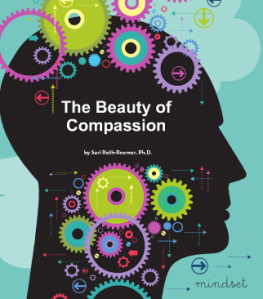 Have you been exercising your compassionate nature?
Have you been exercising your compassionate nature?
Check out my latest article on the importance of fostering compassion in our lives in the new issue of http://www.az-lifestyle.com, Pages 61-63:
http://az-lifestyle.com/2013/4/413.html#p=62
The Beauty of Compassion
Human beings are social creatures by nature. We were designed to live cooperatively and to assist one another in the survival of our species. But in that very design of species survival we were also given an alarm system to warn us of potential danger. So we get anxious, we get scared, or we get angry in response to any type of perceived threat. Back in cave people days, when threats happened only on occasion, that worked pretty well; fast forward to the modern digital age, when we see “threats” to our routine on not only a daily basis, but sometimes on multiple occasions throughout our day. A simple faceless text or email can send us into an orbit of upset. Relationships are impacted. Our ability to live cooperatively and compassionately has been compromised.
Think now about the last time you got upset with someone, whether from a faceless text or phone call, or a face-to-face interaction. How quickly did that feeling arise? How did it feel in your body? Did you hold on to the upset for a while or were you able to let it go fairly quickly? Many of us seem to have a tendency to hold onto our upset. Sometimes we even nurture it: “I can’t believe that person acted that way,” “What is wrong with them?” We stay stuck in our perception of what happened, justify our upset, and even feel deserving of it. But when we do that, we stay stuck in our upset too. Do we deserve that?
Compassion involves being able to step out of your own perspective and become aware that other perspectives exist. You don’t have to agree with the other perspective, but rather acknowledge that it’s there and that it feels valid to the other person, just as your own perspective feels valid to you. Compassion is the ability to understand the emotional state of another person or oneself, which is akin to empathy with the added element of having a desire to alleviate or reduce the suffering of another. Compassion asks that you step out of your viewpoint and recognize that another viewpoint exists alongside yours.
So, how does this work? You are angry at someone and I am suggesting that you internally empathize with them? I am. The minute you are able to empathize and have compassion, your anger will diminish and you will feel better. More than that, you set a course for healing the emotional wound. What effect will holding on to anger have? It will keep you in your anger and upset. But there’s more… Recent research on compassion shows significantly positive health benefits: people who practice daily compassion meditation are found to have brain changes associated with improved stress response, improved immune function, improved ability to receive support from others, improved mood, reduced anxiety, improved ability to recognize other’s emotion and improved overall sense of well-being and life satisfaction. Wow!
Compassion isn’t just for others though. How kind are you to yourself these days? Research shows that this is different than self-esteem, or holding yourself in high positive regard. High self-esteem actually has its down sides. It can create narcissism, a better-than attitude, and can create interpersonal distance rather than connectedness. Self-compassion, on the other hand, allows for self-kindness rather than self-judgment; allows for being an imperfect human in kinship and connection with other imperfect humans; and allows for an appreciation of where you are in the present moment rather than over-personalizing situations. In fact, studies on self-compassion show that self-compassion is associated with more stable feelings of self- worth over time, less social comparison which often leads to shame, less self-consciousness, and reduced anger. Starting to sound pretty good isn’t it?
So, how do you do it? How do you get from anger to compassion in heated situations with yourself or others? You meditate on compassion daily. Seriously. That research that I’ve been mentioning – it has been on people who practice compassion meditation daily. It’s that simple.
In your mind and your heart, say to yourself, then to someone you love unconditionally, then to someone you are in conflict with, then to someone you don’t know very well, then to the whole world:
May I/you/we be filled with loving kindness
May I/you/we be well
May I/you/we be peaceful and at ease
May I/you/we be happy
Give it try. Practice it daily for a month and notice the difference in you. So much to gain, and so very little to lose…
Be happy and well,
Sari Roth-Roemer, Ph.D.
